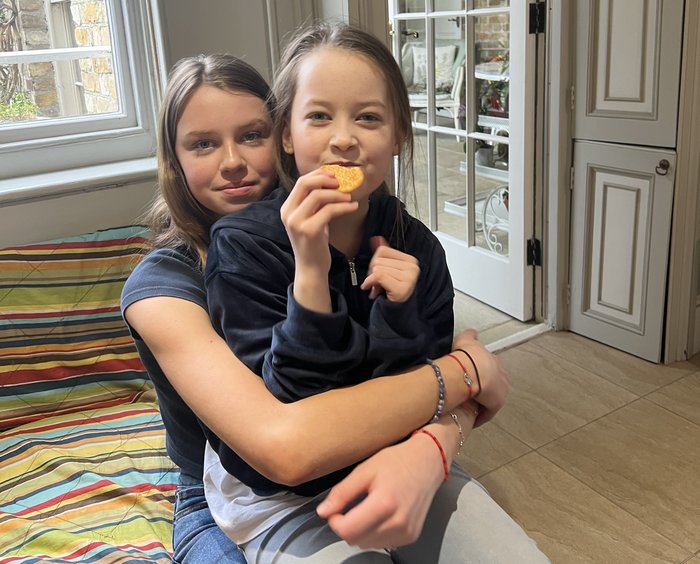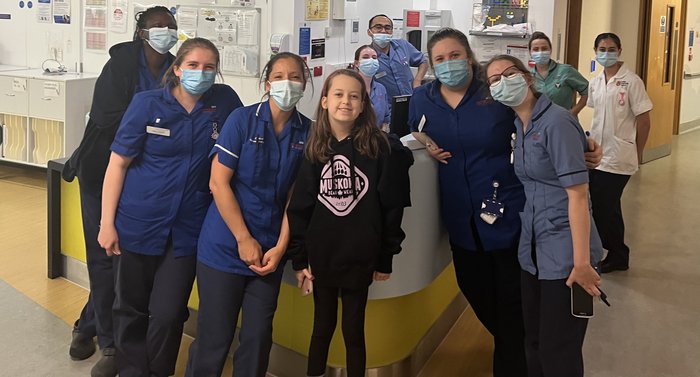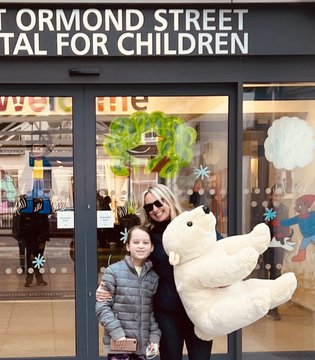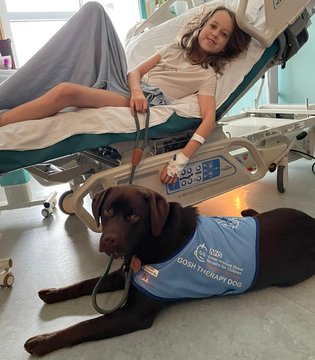"I know three GPs who had never heard of the condition, because it is that rare."
"My daughter Kitty was diagnosed with end stage kidney failure out of the blue in August 2022. We didn’t see it coming – we had no idea her kidneys had been failing for years.
"We went on a sailing trip, and Kitty was incredibly sick. We thought it was motion sickness, but then she was sick again and again. I rang our GP and they arranged for us to see a paediatrician after we got back from holiday. They did a blood test, and afterwards they rang and said we needed to get to hospital in the next two hours."
"The local hospital told us Kitty had complete kidney failure. They liaised with Great Ormond Street Hospital (GOSH) and did another few other tests and we got the official diagnosis of nephronophthisis. There was hardly any information about it available in the UK. I know three GPs who had never heard of the condition, because it is that rare.
"In hindsight, a lot of Kitty’s kidney disease symptoms were masked by hypermobility, which she had previously been diagnosed with. She suffered with fatigue, lack of growth and her feet didn’t change size. Looking back, a lot of that was to do with kidney failure.
"After the nephronophthisis diagnosis, we hoped to keep Kitty off dialysis, but within a week she had deteriorated so much that she had to start peritoneal dialysis."
"She had one night off from dialysis all week, on a Saturday, so that was the only night we could have a break from it."
"It felt unfair. Kitty would say: “Why is this happening to me?” While she was on dialysis, she was seeing pictures of all her friends starting secondary school, while she was being told there was no chance of her joining them.
"Seeing her missing out was difficult. One of her friends did promise: 'Don’t worry, I’ll make a group of friends for us' and she did just that! When Kitty finally started school, she walked into a ready-made friendship group.
"We have an older daughter, Lulu. Visiting Kitty at GOSH was so hard for her. Lulu had to try to keep living a normal life, not knowing if she was going to lose her sister. We also found out that nephronophthisis is a genetic disease, so we had to find out whether Lulu had it; thankfully, she didn’t show any signs of kidney disease.
"On dialysis, Kitty would wake up every day feeling so nauseous. Often an alarm went off during the night if there was an issue with the machine. She had one night off from dialysis all week, on a Saturday, so that was the only night we could have a break from it. Alongside all that was Lulu and her needs. It felt like a full time job. But we were lucky – our families were amazing and were able to offer so much help. A lot of people don’t have that."

"My hope is that this kidney lasts a long time. Maybe Kitty won’t even have to have another transplant."
"While Kitty was receiving dialysis her uncle got tested to see if he could donate a kidney to her. It turned out he had an incredible kidney function, and Kitty got her transplant on 31 January 2023. All went well and Kitty is back in school now, living a relatively normal life.
"People often ask: 'Are you adjusting to the "new normal"?' but I like to think we have gone back to the ‘old normal’, life pre-kidney disease. Kidney disease will never go away, but you have think positively about the future.
"I have to praise the kidney team at both GOSH and Guy’s Hospital. The medical team become your family: they are completely dedicated to saving your child’s life. They go above and beyond anything you’d ever expect. Without them we’d be nowhere.
"I always say to people I feel so grateful we had a fixable problem. My hope is that this kidney lasts a long time. Maybe Kitty won’t even have to have another transplant. It’s been a life changing event, but it has reminded me about the positive things in life, to be frank. Amazing people, miracles of modern medicine, and the strength of character that a 12 year old showed.
"If kidney disease can happen to us, it can happen to anyone. Nephronophthisis is so rare, but I have read that a lot of cases don’t get diagnosed until end stage kidney failure. If both parents have the affected gene there is a 25% of the child having nephronophthisis. You know your child best. Always follow your instincts if you feel there may be something wrong."


